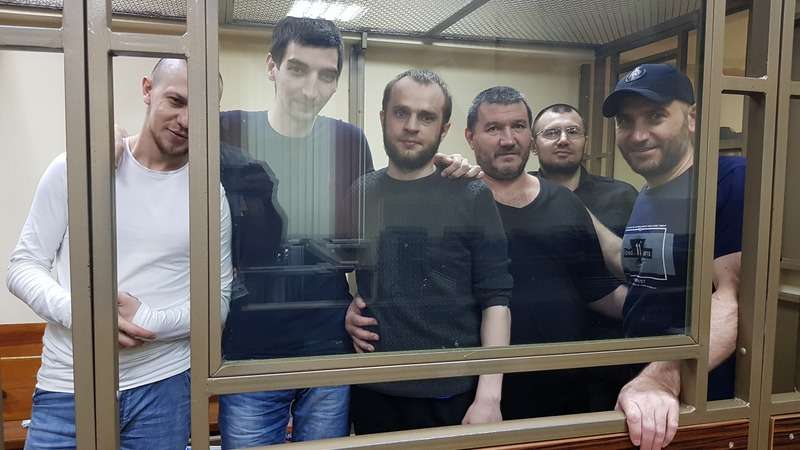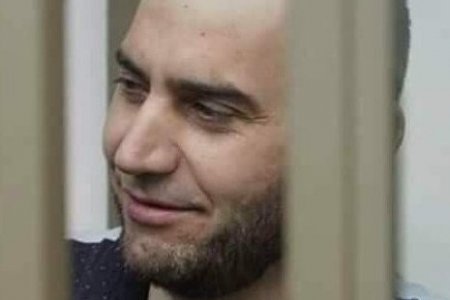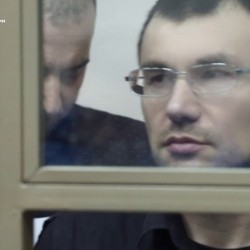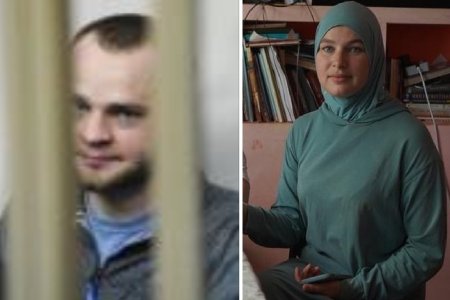
Exactly nine years ago, in the early morning of 11 February 2016, Russia’s FSB began its most brutal attack to date on Crimean Tatar families. Armed and masked burst into eleven homes in the Yalta region of Crimea, profoundly traumatizing small children who woke to find men brandishing machine guns and forcing their fathers to the ground, before taking them away in handcuffs. In many cases, the masked men broke down doors or windows, without any need, as nobody showed any resistance. The arrests that day of Crimean Tatar human rights defender Emir-Usein Kuku (b. 1976); Muslim Aliev (b. 1971) Inver Bekirov (b. 1963); and Vadim Siruk (b. 1989) did, finally, attract at least some international attention to the repression Russia had unleashed on occupied Crimea, with the four, as well as two very young men, Refat Alimov (b. 1991) and Arsen Dzhepparov (b. 1991) who were arrested on 18 April 2016, declared political prisoners and Amnesty International prisoners of conscience. The savage attack was also a major impulse to the formation of the vital Crimean Solidarity human rights movement. The latter has survived, despite initial attempts at intimidation, and then persecution and horrifically long sentences against very many Crimean Solidarity civic journalists and activists.
The crucial role played by Crimean Solidarity, and by courageous Crimean Tatar civic activists generally, cannot be overstated. While the sentences in all of Russia’s political ‘trials’ are essentially predetermined, courageous lawyers, civic activists and journalists have ensured that the international community learns of the politically motivated charges and fabricated evidence, as well as of the torture and other illegal methods used to terrorise the population. Very many have paid a huge price with Russia exacting harsh reprisals even against defences,
The arrests on 11 February 2016 were, in fact, the second ‘round’ in Russia’s main conveyor belt of politically motivated ‘trials’, however the first arrests, just over a year earlier, had elicited frustratingly little attention. It was the FSB’s evident attack on Emir-Usein Kuku which changed that, as well as the mounting role of Crimean Solidarity. The son of a veteran of the Crimean Tatar national movement, Kuku could not fail to react to the mounting number of enforced disappearances and repression under Russian occupation. He joined the Crimean Contact Group on Human Rights and was in charge of monitoring violations in the Yalta region. He had twice faced harassment and persecution in April, then in December 2015, with the first sinister occasion likely to have been an abduction attempt that ‘turned into an FSB operation’ only after Kuku’s cries for help led to a crowd gathering.
Although Kuku’s case received most attention, all of the arrests were politically motivated. Muslim Aliev was targeted for his religious ‘dissidence’, as have been others from his ‘Alushta’ Muslim community, as well as for his civic position. The escalation in the charges against Inver Bekirov, and the arrest of his nephew, Refat Alimov, were almost certainly due to his refusal to collaborate with the FSB, as was the harassment over months and then the arrest of 25-year-old Arsen Dzhepparov. As well as for his pronounced civic position, Vadym Siruk may have been targeted as a warning to other converts to Islam of the dangers they could face.
In all such cases, which the Memorial Human Rights Centre condemned as ‘serial’, the men arrested are not accused of any actual crime, with the charges pertaining purely to unproven allegations of ‘involvement’ in Hizb ut-Tahrir. This is based solely on the flawed 2003 Russian supreme court ruling declaring the peaceful (if controversial) transnational Muslim organization, which is legal in Ukraine, ‘terrorist’. On the basis of that secretive and unexplained ruling, the FSB brings ‘terrorism’ charges, using FSB-loyal ‘experts’ to find spurious ‘proof’ of involvement in Hizb ut-Tahrir. In this case, they claimed to find it in an illicitly recorded conversation “in the kitchen” where the men were discussing the situation in Russia, Ukraine, the fate of Crimea, the place of Islam in both countries and various religious postulates.
These alleged expert assessments’ are supplemented by the supposed testimony of anonymous witnesses, with the court invariably blocking questions from the defence which would prove that the alleged witnesses do not even know the defendants or were lying
Muslim Aliev and Inver Bekirov were designated the role of ‘organizer’ of the so-called ‘Hizb ut-Tahrir cell’, under Article 205.5 § 1 of Russia’s criminal code, while the others were charged with ‘involvement’ under Article 205.5 § 2. All six men were later charged additionally with ‘planning violent seizure of power’ (Article 278).

On 12 November 2019, ‘judges’ Roman Viktorovich Saprunov; Dmitry Viktorovich Merkulov and Roman Vladimirovich Podolsky from the Southern District Military Court in Rostov handed down the six guilty verdicts required of them. These were, on 25 June 2020, upheld by Oleg Aleksandrovich Yegorov; Aleksander Aleksandrovich Mordovin and Anatoly Valentinovich Solin from the Vlasikha military court of appeal. Muslim Aliev and Inver Bekirov were sentenced to 19 years; Emir-Usein Kuku and Vadym Siruk – to 12 years; Refat Alimov to 8 years and Arsen Dzhepparov to seven years. Not one Ukrainian political prisoner has ever been released early, and both Refat and Arsen served their sentences to the last day, The sentences were for maximum-security (or ‘harsh-regime’) prison colonies, with prison administrations imposing even harsher conditions on Crimean Tatar and other Ukrainian political prisoners.
Crimean Solidarity
FSB harassment began from the very first, non-public, meeting of defence lawyers, human rights defenders and relatives of political prisoners on 9 April 2016. Lawyer Emil Kurbedinov told Crimean Realities how, a few minutes into that first meeting, the owner of the premises they were using, came up and said he had received a call from the FSB, demanding that he stop the meeting.
The intimidation, terrorisation and persecution have become ever more brazen and lawless. There have been numerous mass detentions of people who had merely gathered outside ‘court’ buildings to show solidarity with political prisoners, with many jailed for up to 15 days. Although Russia has stopped short of bringing criminal charges against women active in Crimean Solidarity, many, including renowned human rights defenders Lutfiye Zudiyeva and Mumine Saliyeva have faced absurd administrative charges. At least six lawyers defending political prisoners have come under attack, with four of them – Lilia Hemedzhy, Rustem Kyamiliev, Nazim Sheikhmambet and Alexei Ladin stripped of their licence to practise.
The most savage reprisals have, however, been meted out to male Crimean Solidarity civic journalists and activists who have been arrested on such fake ‘terrorism’ charges. In October 2017 and May 2018, of the eight Crimean Tatars seized and sentenced to long terms of imprisoned, almost all were Crimean Solidarity journalists and activists, including Server Mustafayev, one of the organization’s coordinators and an Amnesty International prisoner of conscience. In March 2019, Russia openly targeted Crimean Solidarity, arresting 25 journalists and activists of the human rights movement.
Where intimidation has not worked, Russia uses sentences of up to 20 years’ imprisonment, and will continue to do so, if allowed, in all Ukrainian territory under its occupation. Those who refused to be silent in the face of such lawlessness and repression need our voices now. Please help ensure that they are not forgotten, and that the release of all such Ukrainian political prisoners is a condition of any peace negotiations!
Please also write to Emir-Usein Kuku; Muslim Aliev; Inver Bekirov and Vadym Siruk!
Letters are a lifeline to the men and send an important message to Moscow that its treatment of Ukrainian political prisoners is under scrutiny. Letters need to be in Russian, handwritten, and on ‘safe’ subjects. If that is a problem, use the sample letter below (copying it by hand), perhaps adding a picture or photo. Do add a return address so that the men can answer.
Sample letter
Привет,
Желаю Вам крепкого здоровья и надеюсь, Вы скоро вернетесь домой, к своим родным. Простите, что мало пишу – мне трудно писать по-русски, но мы все о Вас помним.
[Hi. I wish you good health and hope that you will soon be home, with your family. I’m sorry that this letter is short – it’s hard for me to write in Russian., but you are not forgotten. ]
Addresses (these can be in English or Russian, as below)
Muslim Aliev
453256, Россия, Республика Башкортостан, г. Салават, станция Южный, ФКУ ИК-2
Алиеву, Муслиму Нуриевичу, 1971 г.р.
[In English: Russian Federation, 453256, Bashkortostan, Salavat, Stantsiya Yuzhny, Prison No. 2
Aliev, Muslim Nurievich, b. 1971 ]
Inver Bekirov
453256, Россия, Республика Башкортостан, г. Салават, станция Южный, ФКУ ИК-2
Бекирову, Инверу Небиевичу, 1963 г.р
[In English: Russian Federation, 453256, Bashkortostan, Salavat, Stantsiya Yuzhny, Prison No. 2
Bekirov, Inver Nebiyevich, b. 1963 ]
Emir-Usein Kuku
453256, Россия, Республика Башкортостан, г. Салават, ФКУ ИК-16
Куку, Эмиру-Усеину Кемаловичу, 1976 г.р.
[In English: Russian Federation, 453256, Bashkortostan, Salavat, Prison No. 16
Kuku, Emir-Usein Kemalovich, b. 1976 ]
Vadym Siruk
453256, Россия, Республика Башкортостан, г. Салават, станция Южный, ФКУ ИК-2
Сируку, Вадиму Андреевичу, 1989 г.р.
[In English: Russian Federation, 453256, Bashkortostan, Salavat, Stantsiya Yuzhny, Prison No. 2
Siruk, Vadim Andreevich, b. 1989 ]



